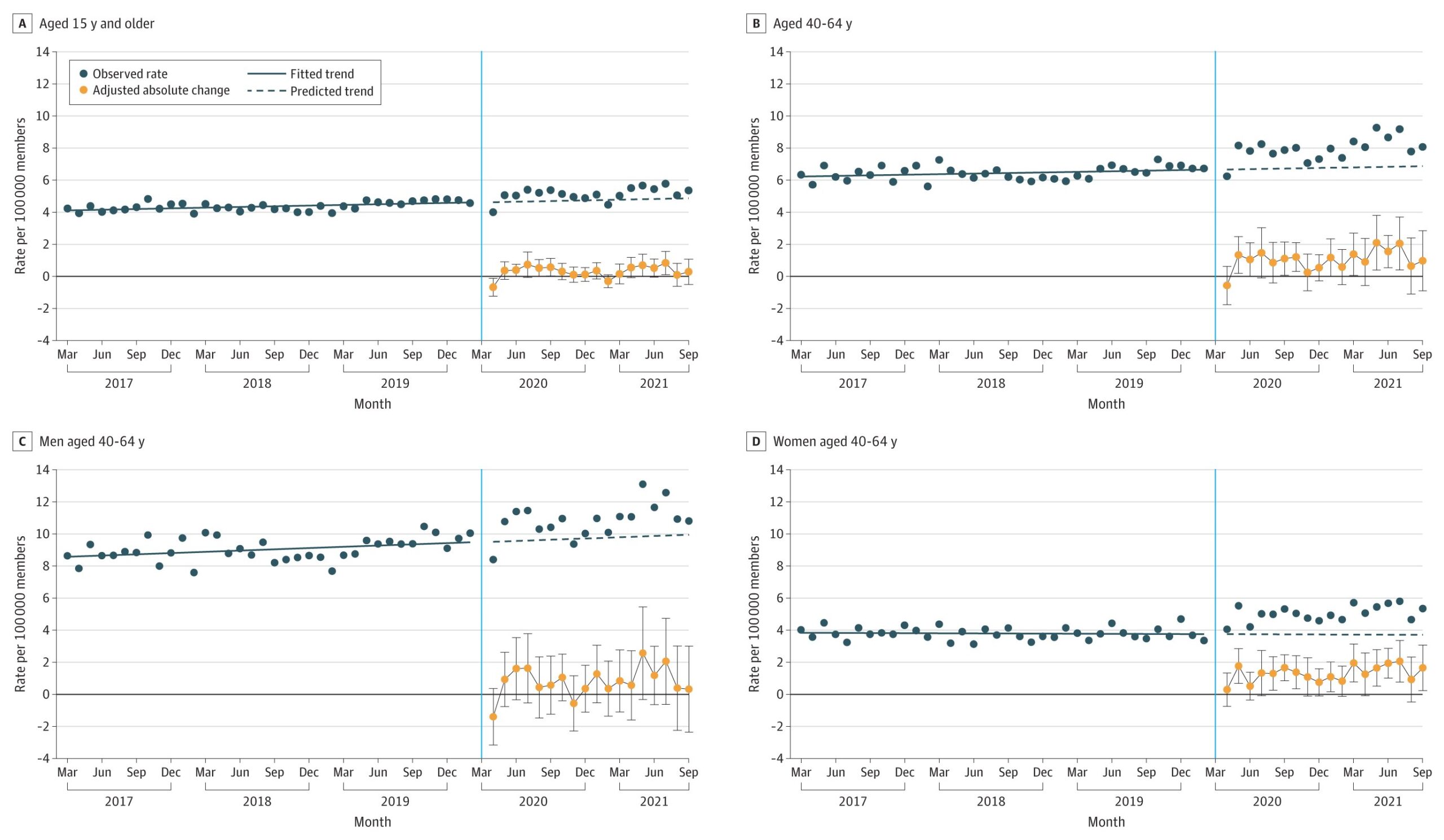Health
Pandemic drinking is hitting middle-aged women the hardest, research shows

Monthly rates of serious alcohol-related complications among a national commercially insured population. Adjusted and predicted percentages were generated using unadjusted segmented regression. Absolute change estimates and 95% CIs (error bars) were generated from regression model coefficients using nonlinear combinations of parameters, adjusting for member-level age range, gender, US division, seasonality, and poverty level of residence based on a zip code of 5 digits. . A. Complication episodes in all age groups include diagnoses representing acute decompensation of chronic alcohol-related diseases presenting in the emergency department, observation unit, or hospital, such as acute alcohol-related hepatitis, alcohol-related cardiomyopathy, or alcohol gastritis with hemorrhage. The diagnoses were independently developed and cross-verified by two authors (BS and JFW). There was 95% agreement with the classifications and differences were assessed and reconciled. B: Adults aged 40 to 64 years are shown because this age range had high rates of alcohol-related morbidity and mortality. Age category was not included in the regression model for the analyzes depicted. C and D: Male and female adults aged 40 to 64 years appear to highlight differences in alcohol-related high-acuity complications. Age range and gender are not included in the regression models for the analyzes depicted. The vertical blue line indicates the time the COVID-19 public health emergency was declared. Credit: JAMA Health Forum (2024). doi:10.1001/jamahealthforum.2024.0501
Middle-aged women experienced an increase in alcohol-related health complications during the COVID-19 pandemic, according to new research led by a University of Pittsburgh physician-scientist. published today JAMA Health Forum.
The scientists say the research raises alarm bells pointing to the need for immediate public health and clinical interventions to reverse the trends, including urgent communication about the risks of alcohol consumption.
“Although alcohol-related deaths are higher among men than among women, the rate of change has increased more rapidly among women than among men over the past decade,” said lead author Bryant Shuey, MD, MPH, assistant professor of medicine and physician of internal medicine. at UPMC. “We expected that there would be some increase in hospital admissions for alcohol-related complications in women. We didn’t know it would be so serious.”
The data for the study came from an unidentified commercial insurance database and included more than 14 million patients ages 15 and older. The researchers looked at monthly rates of alcohol-related complications that required emergency medical care, including alcohol-related liver diseases, such as cirrhosis or hepatitis, as well as alcohol withdrawal and alcohol-related heart disease, among others.
Researchers then analyzed and compared the monthly number of hospitalizations for alcohol-related complications during the pandemic with what would have been expected based on the pre-pandemic trend. Hospital admissions for alcohol-related complications in middle-aged women were higher than expected in 10 out of 18 months after the start of the pandemic in the US, compared to four out of 18 months across all ages and genders.
Middle-aged women experienced higher-than-expected hospitalizations for alcohol-related liver disease in 16 of the 18 months of the pandemic. To the researchers, this was alarming, as alcohol-related liver disease is the leading underlying cause of alcohol-related deaths in the US.
The authors were unable to determine the exact reasons for these increases, although previous research has found that American women have increased alcohol consumption more than men over the past decade. While men drink alcohol more often and in greater quantities than women, alcohol consumption among men has remained the same or even decreased over the past decade.
An additional increase in alcohol consumption experienced by women during the pandemic may have pushed new or worsening alcohol-related health problems over the edge, leading to hospitalization, the researchers report. Difficulties accessing outpatient healthcare during the pandemic and relaxed alcohol policies, such as alcohol dispensing, could also have contributed to higher rates of high acuity episodes.
“We know that reducing the amount of alcohol one drinks can improve health, and we have tools available to help people drink less,” Shuey said. “There are effective treatments for alcohol addiction, ranging from behavioral interventions to medications. There are also effective policies to reduce harmful alcohol use, such as increasing alcohol taxes and limiting advertising.”
Findings also suggest that a similar increase in alcohol-related complications may have affected men, but further research is needed.
More information:
Bryant Shuey et al, Alcohol-related high-acuity complications during the COVID-19 pandemic, JAMA Health Forum (2024). DOI: 10.1001/jamahealthforum.2024.0501. jamanetwork.com/journals/jama-…/fullarticle/2817439
Quote: Pandemic drinking hit middle-aged women hardest, study results (2024, April 12) retrieved April 13, 2024 from https://medicalxpress.com/news/2024-04-pandemic-middle-aged-women-hardest.html
This document is copyrighted. Except for fair dealing purposes for the purpose of private study or research, no part may be reproduced without written permission. The content is provided for informational purposes only.













